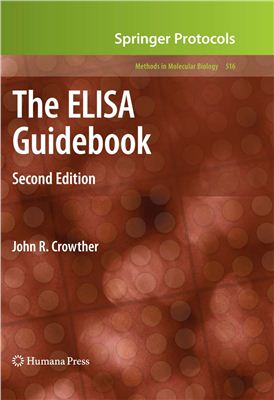Humana Press, 2009. - 574 p. - The Enzyme Linked Immunosorbent
Assay (ELISA) continues, as predicted, to be the predominant assay
used in biomedical and agricultural research. While little has
changed in the principles of the ELISAs used since the publication
of The ELISA Guidebook, many technological advantages, including
the increasing number of reagents available for exploitation and
the larger spectrum of instruments to measure the coloured products
of ELISAs, have greatly benefited the field. Other testing
technologies using molecular techniques, predominantly the
conventional and more and more often, real time PCR, are rapidly
evolving to help diagnose and differentiate disease agents and
identify substances present in exquisitely small amounts. The ELISA
is still needed either alone in mass screening, such as serological
assays, or used in tandem with molecular techniques to fully
evaluate the molecular and antigenic nature of analytes.
John R. Crowther provides today’s premier practical guide to the understanding and application of ELISA. This Edition enlarges on charting methods for assessing the indirect ELISA, ruggedness and robustness of tests, aspects of kit use and validation, and inteal quality control and exteal quality management of data. The author describes each method in great detail to ensure experimental success and includes advice on equipment choice, maintenance, and calibration. Wherever possible, helpful written explanations are provided along with copious diagrams.
With its numerous worked examples, detailed instructions, and extensive illustrations, The ELISA Guidebook, Second Edition offers a powerful synthesis of all the basic concepts and practical experimental details investigators need to understand, develop, and apply ELISA methodology successfully in day-to-day basic and clinical research.
John R. Crowther provides today’s premier practical guide to the understanding and application of ELISA. This Edition enlarges on charting methods for assessing the indirect ELISA, ruggedness and robustness of tests, aspects of kit use and validation, and inteal quality control and exteal quality management of data. The author describes each method in great detail to ensure experimental success and includes advice on equipment choice, maintenance, and calibration. Wherever possible, helpful written explanations are provided along with copious diagrams.
With its numerous worked examples, detailed instructions, and extensive illustrations, The ELISA Guidebook, Second Edition offers a powerful synthesis of all the basic concepts and practical experimental details investigators need to understand, develop, and apply ELISA methodology successfully in day-to-day basic and clinical research.

